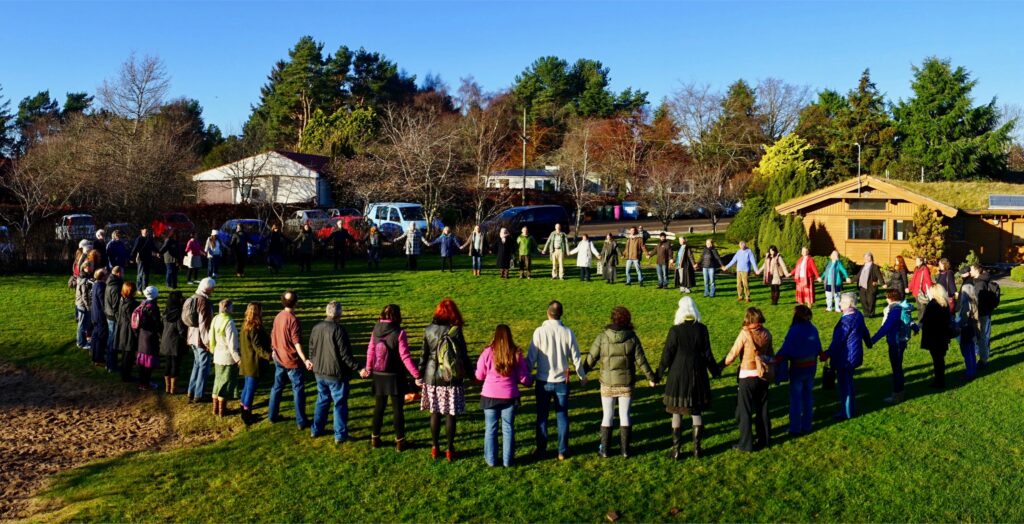‘We regard our living together not as an unfortunate mishap warranting endless competition among us, but as a deliberate act of God to make us a community of brothers and sisters jointly involved in the quest for a composite answer to the varied problems of life.’ Steven Biko, South African activist and civil rights leader
It seems that many of us have a deep yearning to live differently, in a way that is kinder and more loving.
Perhaps, many imagine, this will come from simply joining together and living in a manner different from what we’ve known. Different from the mainstream choice of fast-paced and often unfriendly cities where nobody willingly talks to strangers.
In my years based in the north-east of Scotland, within the pioneering and globally celebrated Findhorn Foundation community, hardly a week went by without my meeting a visitor who’d wistfully declare: “It’s so beautiful here. I want to live here, or like this.” Many did. For weeks, months and even years.
Yet beauty is in the eye of the beholder. I remember signing up for the month-long Ecovillage Training offered in 2008 and wondering what had called me to a place as far north as Moscow and in the bleak winter chill of February.
Are you crazy, I questioned. Barely 48 hours earlier I’d been sunning myself on a sublime Cape Town beach, my biggest concern, if I had one, being about getting burnt. Was I making a terrible and expensive mistake to give this all up, even if just for four weeks.
Stepping off my flight in Aberdeen Airport I was greeted by a grey and white snow-blanketed world, with the brightness turned right down by a giant and unseen dimmer switch. The ground was dangerously slippery underfoot. My trainers sucked in icy water, chilling my toes. My breath created puffs of steam in the frigid air. After a sobering night in a soulless airport hotel, I caught a bus to the Aberdeen city centre and then another for the two-hour haul to Findhorn, which sits on a small peninsula near the town of Forres, less than an hour’s drive from the growing city of Inverness.
Looking out of the misted-up windows, I noticed that winter had sucked much of the colour out of the landscape, fields and farmlands framing my view on all sides.
Arriving in the community and Ecovillage of Findhorn was a little warmer. There was less snow, the wintry sun making a brave appearance. I heard talk of a microclimate and one enthusiastic local declared it to be part of the Riviera of Scotland. I laughed, wrongly thinking a joke was intended.
A day later I stood in a circle of 31 participants and two focalisers, which is Findhorn-speak for those that hold the focus or spiritual intention of the gathering.
“I’m really not into this,” I announced to the room at large. And yet I was. Within days I’d fallen in love with everyone in that circle. And with life itself. On my last day I attended Taizé devotional singing for the first time and my heart cracked wide open. I fought back tears at the beauty of it all.
Walking through the nearby woods to regain my composure, I watched woodpeckers searching for insect morsels, saw red squirrels leaping from tree to tree, witnessed the waves breaking on a pebbled shore. I was overwhelmed and the clincher came when I wandered into the Phoenix community store and bought a book entitled No Destination by spiritual and ecological activist Satish Kumar.
I’d never heard of him before, but his words struck a deep chord. Yes, there was another way of living. One committed to kindness and service. To contribute to the wider good. To the courage to be authentic and follow an inner prompting
I was hooked, the spark of an idea being fanned into a flame that became all-consuming. There was another way and I determined to explore it, joining the community as a volunteer journalist. Initially for six months that soon grew into seven years in which I became writer-in-residence and the head of public relations. The editor of auto magazines and petrolhead who’d lived for his next adrenaline fix in a fast road car, or race or rally car, had morphed into a spin doctor for a spiritual community that is an oasis for green living.
One of my proudest moments was when I hosted CNN International during a TV series called Going Green. It showcased ways of living that are kinder to the Earth and each other. Around the same time, I hosted the CNBC network, with their cameraman and writers posing the question: “Could this be the cleanest, friendliest place to live in the world?”
Everyone seems to have a different take on what makes Findhorn a modern Utopia
For me it is a multi-layered and full-featured community of mostly kindred souls. It boasts gardens where yummy vegetables are grown organically and biodynamically without resorting to toxic chemicals, wood is harvested locally for heating, buildings sport solar panels and a trio of wind turbines harvest much of the electricity needs.
Residents sing, dance and celebrate together, joining in daily and seasonal rituals. They also grieve the passing of elders together, some residents choosing to be laid to rest in the local green burial ground.
A once degraded and storm-ravaged plantation is transforming into a natural woodland with a diversity of trees that is welcoming to both the creatures and humans. There are no traditional gravestones or markers and biodegradable shrouds or coffins are chosen, the most popular of which is probably cheap wooden boxes in which the community’s solar panels are delivered.
I’ve seen communities fail, often when charismatic or motivational leadership passes on or away, or when residents can’t get on because there wasn’t enough glue to hold them together in the first place. Ego often plays a part in the dismantling.
For me the core values of Findhorn are pivotal. Although they were originally provided by the founders, they are no longer dependent on individuals. The values seem to have a universal resonance. They are co-creation with the intelligence of nature, embracing work as love in action and the practice of deep inner listening. I believe we are all individuations of the Divine and that God (or whatever you call that creative force) lives within us all.
I’m happy to substitute the words Life and Love for that force and prefer not to be too dogmatic or prescriptive.
Part of Findhorn’s success is that it draws players and participants from all corners of the globe, all walks of life and a diversity of religious and spiritual persuasions. It tries to be embracing and non-judgemental.
There is a Common Ground that I find inspiring, although I suspect some have never read it or certainly haven’t dwelt on its deeper significance or commitments.
Covid has been tough. The Findhorn Foundation’s staff complement shrunk from around 120 to fewer than 50 as many lost their jobs and some their homes and dreams. An arsonist and former community member torched the Community Centre and main Meditation Sanctuary, striking a blow to the social and spiritual heartland. One friend observed: “At last Findhorn has learned to be real; to be angry.”
And yet I like to believe that all is very, very well. What is happening, needs to happen. The wider community of more than 40 organisations is stepping up and the role of the Findhorn Foundation, which was once THE community, is shifting while continuing to hold an important educational focus.
Programmes like Findhorn Experience Week have introduced many thousands to the concepts of community and cooperative living. It was also here that the Global Ecovillage Network was born, sparking collaborations in more than 100 countries around the world. ‘GEN’ is a force of nature and we humans are of course part of nature.
I don’t claim to have the answers after my 15-year association with Findhorn, although I do heartily recommend sampling Experience Week if you can afford it. Then being quiet, attuning to that still small voice within, and following your heart. Rather than your head.
When I asked co-founder Dorothy Maclean, who passed in 2020 at the age of 100, for her advice, she insisted: “Just be more loving.”


